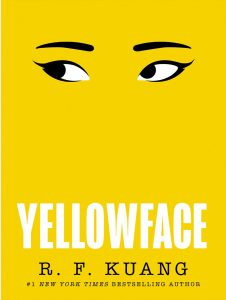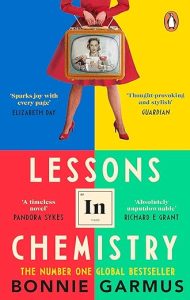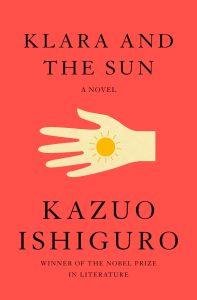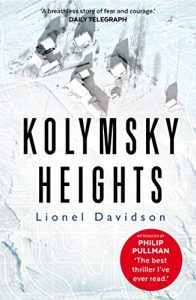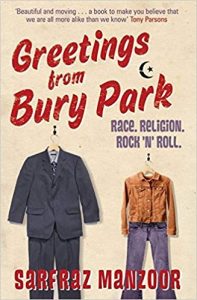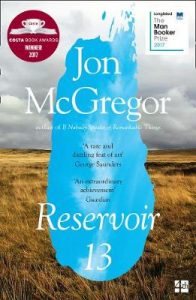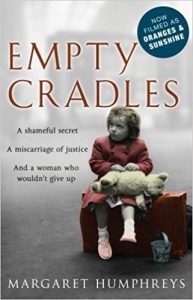The Malvern Community Book Club meets monthly…
Mums and dads – and nans and grandads – are welcome to join the Malvern Community Book Club. This is a very informal, social gathering. Please talk to Mr.Kynaston if you’re interested or would like a little bit more information.
Our next Book Club meeting will take place on Thursday 10th July 2025 at 7.30pm in The Derby Lodge.
 We are currently reading The Miniaturist by Jessie Burton.
We are currently reading The Miniaturist by Jessie Burton.
Set in seventeenth century Amsterdam – a city ruled by glittering wealth and oppressive religion. The Miniaturist is a masterful debut steeped in atmosphere and shimmering with mystery, in the tradition of Emma Donoghue, Sarah Waters, and Sarah Dunant.
“There is nothing hidden that will not be revealed . . .”
On a brisk autumn day in 1686, eighteen-year-old Nella Oortman arrives in Amsterdam to begin a new life as the wife of illustrious merchant trader Johannes Brandt. But her new home, while splendorous, is not welcoming. Johannes is kind yet distant, always locked in his study or at his warehouse office – leaving Nella alone with his sister, the sharp-tongued and forbidding Marin.
But Nella’s world changes when Johannes presents her with an extraordinary wedding gift: a cabinet-sized replica of their home. To furnish her gift, Nella engages the services of a miniaturist – an elusive and enigmatic artist whose tiny creations mirror their real-life counterparts in eerie and unexpected ways . . .
Johannes’ gift helps Nella to pierce the closed world of the Brandt household. But as she uncovers its unusual secrets, she begins to understand – and fear – the escalating dangers that await them all. In this repressively pious society where gold is worshipped second only to God, to be different is a threat to the moral fabric of society, and not even a man as rich as Johannes is safe. Only one person seems to see the fate that awaits them. Is the miniaturist the key to their salvation . . . or the architect of their destruction?
 We have recently read Rules of Civility by Amor Towles.
We have recently read Rules of Civility by Amor Towles.
Set in New York City in 1938, Rules of Civility tells the story of a watershed year in the life of an uncompromising twenty-five-year-old named Katey Kontent. Armed with little more than a formidable intellect, a bracing wit, and her own brand of cool nerve, Katey embarks on a journey from a Wall Street secretarial pool through the upper echelons of New York society in search of a brighter future.
The story opens on New Year’s Eve in a Greenwich Village jazz bar, where Katey and her boardinghouse roommate Eve happen to meet Tinker Grey, a handsome banker with royal blue eyes and a ready smile. This chance encounter and its startling consequences cast Katey off her current course, but end up providing her unexpected access to the rarified offices of Conde Nast and a glittering new social circle. Befriended in turn by a shy, principled multimillionaire, an Upper East Side ne’er-do-well, and a single-minded widow who is ahead of her times, Katey has the chance to experience first-hand the poise secured by wealth and station, but also the aspirations, envy, disloyalty, and desires that reside just below the surface. Even as she waits for circumstances to bring Tinker back into her orbit, she will learn how individual choices become the means by which life crystallizes loss.
We have recently read The Curator by M.W. Craven.
It’s Christmas and a serial killer is leaving displayed body parts all over Cumbria. A strange message is left at each scene: #BSC6. Called in to investigate, the National Crime Agency’s Washington Poe and Tilly Bradshaw are faced with a case that makes no sense. Why were some victims anaesthetized, while others died in appalling agony? Why is their only suspect denying what they can irrefutably prove but admitting to things they weren’t even aware of? And why did the victims all take the same two weeks off work three years earlier?
And when a disgraced FBI agent gets in touch things take an even darker turn. Because she doesn’t think Poe is dealing with a serial killer at all; she thinks he’s dealing with someone far, far worse – a man who calls himself the Curator.
And nothing will ever be the same again…
We have read Hamnet by Maggie O’Farrell.
The Goodreads website says: Drawing on Maggie O’Farrell’s long-term fascination with the little-known story behind Shakespeare’s most enigmatic play, Hamnet is a luminous portrait of a marriage – at its heart the loss of a beloved child.
Warwickshire in the 1580s. Agnes is a woman as feared as she is sought after for her unusual gifts. She settles with her husband in Henley Street, Stratford, and has three children: a daughter, Susanna, and then twins, Hamnet and Judith. The boy, Hamnet, dies in 1596, aged eleven. Four years or so later, the husband writes a play called Hamlet.
Award-winning author Maggie O’Farrell’s novel breathes full-blooded life into the story of a loss usually consigned to literary footnotes, and provides an unforgettable vindication of Agnes, a woman intriguingly absent from history.
We have recently read Love is Blind by William Boyd.
The website www.goodreads.com says:
Love is Blind is William Boyd’s sweeping, heart-stopping 2018 novel. Set at the end of the 19th century, it follows the fortunes of Brodie Moncur, a young Scottish musician, about to embark on the story of his life.
When Brodie is offered a job in Paris, he seizes the chance to flee Edinburgh and his tyrannical clergyman father, and begin a wildly different new chapter in his life. In Paris, a fateful encounter with a famous pianist irrevocably changes his future – and sparks an obsessive love affair with a beautiful Russian soprano, Lika Blum. Moving from Paris to St Petersburg to Edinburgh and back again, Brodie’s love for Lika and its dangerous consequences pursue him around Europe and beyond, during an era of overwhelming change as the nineteenth century becomes the twentieth.
Love is Blind is a tale of dizzying passion and brutal revenge; of artistic endeavour and the illusions it creates; of all the possibilities that life can offer, and how cruelly they can be snatched away. At once an intimate portrait of one man’s life and an expansive exploration of the beginning of the twentieth century, Love is Blind is a masterly novel from one of Britain’s best loved storytellers.
We have recently read Lockwood & Co: The Screaming Staircase by Jonathan Stroud.
When the dead come back to haunt the living, Lockwood & Co. step in . . .
For more than fifty years, the country has been affected by a horrifying epidemic of ghosts. A number of Psychic Investigations Agencies have sprung up to destroy the dangerous apparitions.
Lucy Carlyle, a talented young agent, arrives in London hoping for a notable career. Instead, she finds herself joining the smallest most ramshackle agency in the city, run by the charismatic Anthony Lockwood. When one of their cases goes horribly wrong, Lockwood & Co. have one last chance of redemption. Unfortunately, this involves spending the night in one of the most haunted houses in England – and trying to escape alive.
Set in a city stalked by spectres, The Screaming Staircase is the first in a chilling series full of suspense, humour and truly terrifying ghosts. Your nights will never be the same again . . .
We have recently read The Fat Lady Sings by Jacqueline Roy.
A ground breaking novel exploring the intersection between race, class and mental health in the UK. It is the 1990s, and Gloria is living in a London psychiatric ward. She is unapologetically loud, audacious and eternally on the brink of bursting into song.
After several months of uninterrupted routine, she is joined by another young black woman – Merle – who is full of silences and fear. Unable to confide in their doctors, they agree to journal their pasts. Whispered into tape recorders and scrawled ferociously at night, the remarkable stories of their lives are revealed.
In this tender, deeply-moving depiction of mental health, Roy creates a striking portrait of two women finding strength in their shared vulnerability, as they navigate a system that fails to protect them. Life-affirming and fearlessly hopeful, this is an unforgettable story.
 We have recently read ‘The Crow Road’ by Iain Banks.
We have recently read ‘The Crow Road’ by Iain Banks.
The website www.goodreads.com says: ‘It was the day my grandmother exploded. I sat in the crematorium, listening to my Uncle Hamish quietly snoring in harmony to Bach’s Mass in B Minor, and I reflected that it always seemed to be death that drew me back to Gallanach.’
Prentice McHoan has returned to the bosom of his complex but enduring Scottish family. Full of questions about the McHoan past, present and future, he is also deeply preoccupied…… From its bravura opening onwards, THE CROW ROAD is justly regarded as an outstanding contemporary novel.
We have recently read ‘Shrines of Gaiety’ by Kate Atkinson
The Waterstone’s website says:
Evoking the bohemian atmosphere of Jazz Age London and peppered with unforgettable larger-than-life characters, Shrines of Gaiety finds the award-winning author of Life After Life on peerless form as she recounts the spectacular story of Nellie Coker, queen of the capital’s nightlife.
From the initiable bestselling author, Kate Atkinson, a mesmerising novel set in the glittering world of Soho in the 1920s – a place of gangsters and showgirls, Bright Young Things and one remarkable woman.
1926, and in a country still recovering from the Great War, London has become the focus for a delirious new nightlife. In the clubs of Soho, peers of the realm rub shoulders with starlets, foreign dignitaries with gangsters, and girls sell dances for a shilling a time. At the heart of this glittering world is notorious Nellie Coker, ruthless but also ambitious to advance her six children, including the enigmatic eldest, Niven whose character has been forged in the crucible of the Somme.
But success breeds enemies, and Nellie’s empire faces threats from without and within. For beneath the dazzle of Soho’s gaiety, there is a dark underbelly, a world in which it is all too easy to become lost. With her unique Dickensian flair, Kate Atkinson brings together a glittering cast of characters in a truly mesmeric novel that captures the uncertainty and mutability of life; of a world in which nothing is quite as it seems.
We have recently read ‘Remarkably Bright Creatures’ by Shelby Van Pelt
The Waterstone’s website says:
An endearingly quirky feelgood mystery novel with a very unusual pairing at its heart, Remarkably Bright Creatures charts the growing bond between aquarium worker Tova and Marcellus the octopus, as they attempt to discover how and why Tova’s son disappeared.
After Tova Sullivan’s husband died, she began working the night cleaner shift at the Sowell Bay Aquarium. Ever since her eighteen-year-old son, Erik, mysteriously vanished on a boat over thirty years ago keeping busy has helped her cope.
One night she meets Marcellus, a giant Pacific octopus living at the aquarium who sees everything, but wouldn’t dream of lifting one of his eight arms for his human captors – until he forms a remarkable friendship with Tova.
Ever the detective, Marcellus deduces what happened the night Tova’s son disappeared. And now Marcellus must use every trick his old body can muster to unearth the truth for her before it’s too late.
Shelby Van Pelt’s debut novel is a reminder that sometimes taking a hard look at the past can help uncover a future that once felt impossible.
We have recently read ‘The Remains of the Day’ by Kazuo Ishiguro.
The Faber & Faber website says:
A contemporary classic, The Remains of the Day is Kazuo Ishiguro’s beautiful and haunting evocation of life between the wars in a Great English House. In the summer of 1956, Stevens, the ageing butler of Darlington Hall, embarks on a leisurely holiday that will take him deep into the countryside and into his past.
‘A triumph . . . This wholly convincing portrait of a human life unweaving before your eyes is inventive and absorbing, by turns funny, absurd and ultimately very moving.’ Sunday Times
‘A dream of a book: a beguiling comedy of manners that evolves almost magically into a profound and heart-rending study of personality, class and culture.’ New York Times Book Review
We have recently read ‘Yellowface’ by R.F. Kuang
The website www.goodreads.com says: Authors June Hayward and Athena Liu were supposed to be twin rising stars: same year at Yale, same debut year in publishing. But Athena’s a cross-genre literary darling, and June didn’t even get a paperback release. Nobody wants stories about basic white girls, June thinks.
So when June witnesses Athena’s death in a freak accident, she acts on impulse: she steals Athena’s just-finished masterpiece, an experimental novel about the unsung contributions of Chinese laborers to the British and French war efforts during World War I.
So what if June edits Athena’s novel and sends it to her agent as her own work? So what if she lets her new publisher rebrand her as Juniper Song–complete with an ambiguously ethnic author photo? Doesn’t this piece of history deserve to be told, whoever the teller? That’s what June claims, and the New York Times bestseller list seems to agree.
But June can’t get away from Athena’s shadow, and emerging evidence threatens to bring June’s (stolen) success down around her. As June races to protect her secret, she discovers exactly how far she will go to keep what she thinks she deserves.
With its totally immersive first-person voice, Yellowface takes on questions of diversity, racism, and cultural appropriation not only in the publishing industry but the persistent erasure of Asian-American voices and history by Western white society. R. F. Kuang’s novel is timely, razor-sharp, and eminently readable.
We have recently read ‘Lessons in Chemistry’ by Bonnie Garmus
Waterstone’s says: Smart, funny, joyous and powerful, Garmus’ 60s set debut featuring an unconventional female scientist with a quiet game-plan to change the world has won the hearts and minds of our booksellers and is undoubtedly one of 2022’s most gloriously enjoyable debuts.
But it’s the early 1960s and her all-male team at Hastings Research Institute take a very unscientific view of equality. Except for one: Calvin Evans; the lonely, brilliant, Nobel-prize nominated grudge-holder who falls in love with – of all things – her mind. True chemistry results.
But like science, life is unpredictable. Which is why a few years later, Elizabeth Zott finds herself not only a single mother, but the reluctant star of America’s most beloved cooking show Supper at Six. Elizabeth’s unusual approach to cooking (‘combine one tablespoon acetic acid with a pinch of sodium chloride’) proves revolutionary. But as her following grows, not everyone is happy. Because as it turns out, Elizabeth Zott isn’t just teaching women to cook. She’s daring them to change the status quo.
Meet the unconventional, uncompromising Elizabeth Zott.
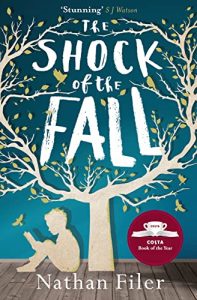 We have recently read ‘The Shock of the Fall’ by Nathan Filer
We have recently read ‘The Shock of the Fall’ by Nathan Filer
Winner of the Costa Book of the Year 2013
I’ll tell you what happened because it will be a good way to introduce my brother. His name’s Simon. I think you’re going to like him. I really do. But in a couple of pages he’ll be dead. And he was never the same after that.
There are books you can’t stop reading, which keep you up all night.
There are books which let us into the hidden parts of life and make them vividly real.
There are books which, because of the sheer skill with which every word is chosen, linger in your mind for days.
The Shock of the Fall is all of these books.
The Shock of the Fall is an extraordinary portrait of one man’s descent into mental illness. It is a brave and groundbreaking novel from one of the most exciting new voices in fiction.
We have recently read ‘Slade House’ by David Mitchell.
The Waterstone’s website says:
One might assume that Gone Girl’s Gillian Flynn wouldn’t spook easily, or that, lauded as she is for creating a skin-crawlingly creepy tale, she might somehow be hardened to effects of the thriller genre. Yet of David Mitchell’s Slade House she admits: ‘Plants died, milk curdled, and my children went slightly feral as I succumbed to [its] creepy magic. It’s a wildly inventive, chilling, and – for all its otherworldliness – wonderfully human haunted house story.’
Spawned from a short story that Mitchell first published on Twitter, Slade House is his shortest book at just 200 pages and like Cloud Atlas, is a collection of novellas housed together within a single cover. Each is set nine years after the one before it when, on the last Saturday of October, the impossible-to-discover Slade House welcomes a new visitor – a visitor who will never leave, as his or her soul is feasted upon by the twin Anchorite cult-members Jonah and Norah, in order to sustain their youth.
True to form, Mitchell includes plenty of reference to his previous novels (although it isn’t necessary to have read them in order to enjoyably consume this one). But there is something new here that hasn’t before been as fully explored by the award-winning author (and that might surprise given the book’s frightening premise): total hilarity of the all-out, farce-laden, parody-filled variety.
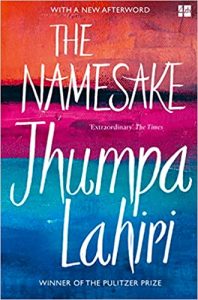 We have recently read The Namesake by Jhumpa Lahiri.
We have recently read The Namesake by Jhumpa Lahiri.
The Women’s Prize for Fiction website says:
Jhumpa Lahiri’s Interpreter of Maladies established this young writer as one the most brilliant of her generation. Her stories are one of the very few debut works — and only a handful of collections — to have won the Pulitzer Prize for fiction. Among the many other awards and honors it received were the New Yorker Debut of the Year award, the PEN/Hemingway Award, and the highest critical praise for its grace, acuity, and compassion in detailing lives transported from India to America. In The Namesake, Lahiri enriches the themes that made her collection an international bestseller: the immigrant experience, the clash of cultures, the conflicts of assimilation, and, most poignantly, the tangled ties between generations. Here again Lahiri displays her deft touch for the perfect detail — the fleeting moment, the turn of phrase — that opens whole worlds of emotion.
The Namesake takes the Ganguli family from their tradition-bound life in Calcutta through their fraught transformation into Americans. On the heels of their arranged wedding, Ashoke and Ashima Ganguli settle together in Cambridge, Massachusetts. An engineer by training, Ashoke adapts far less warily than his wife, who resists all things American and pines for her family. When their son is born, the task of naming him betrays the vexed results of bringing old ways to the new world. Named for a Russian writer by his Indian parents in memory of a catastrophe years before, Gogol Ganguli knows only that he suffers the burden of his heritage as well as his odd, antic name. Lahiri brings great empathy to Gogol as he stumbles along the first-generation path, strewn with conflicting loyalties, comic detours, and wrenching love affairs. With penetrating insight, she reveals not only the defining power of the names and expectations bestowed upon us by our parents, but also the means by which we slowly, sometimes painfully, come to define ourselves. The New York Times has praised Lahiri as “a writer of uncommon elegance and poise.” The Namesake is a fine-tuned, intimate, and deeply felt novel of identity.
We have recently read ‘Klara and the Sun’ by Kazou Ishiguro.
The www.goodreads.com website says:
From her place in the store, Klara, an Artificial Friend with outstanding observational qualities, watches carefully the behavior of those who come in to browse, and of those who pass on the street outside. She remains hopeful that a customer will soon choose her, but when the possibility emerges that her circumstances may change forever, Klara is warned not to invest too much in the promises of humans.
In Klara and the Sun, Kazuo Ishiguro looks at our rapidly changing modern world through the eyes of an unforgettable narrator to explore a fundamental question: what does it mean to love?
Our October book is ‘Kolymsky Heights’ by Lionel Davidson.
The Faber website says:
A sensational classic: this chilling tale of Siberian espionage is ‘the best thriller I’ve ever read’ (Philip Pullman) ranking with ‘The Silence of the Lambs, Casino Royale and Smiley’s People‘ (Spectator).
‘Hugely thrilling, brilliantly written, perfect … I didn’t want this book to end.’ (Anthony Horowitz)
Kolymsky Heights. A Siberian hell lost in endless night: the perfect setting for an underground Russian research station. It’s a place so secret it doesn’t officially exist; once there, the scientists are forbidden to leave. But one scientist is desperate to get a message to the outside world. So desperate, he sends a plea across the wildness to the West in order to summon the one man alive capable of achieving the impossible …
‘Sensationally good … One of the great thrillers of the last century.’ (Charles Cumming)
‘As significant as … le Carré in bringing a gritty new realism to the thriller.’ (Sunday Telegraph)
‘A breathless story of fear and courage.’ (Daily Telegraph)
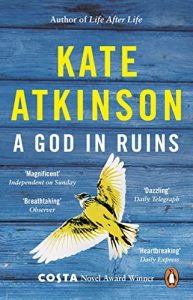 Our current book is ‘A God in Ruins’ by Kate Atkinson.
Our current book is ‘A God in Ruins’ by Kate Atkinson.
Winner of the 2015 Costa Award.
The Waterstones’s website says: A God in Ruins relates the life of Teddy Todd – would-be poet, heroic World War II bomber pilot, husband, father, and grandfather – as he navigates the perils and progress of the 20th century. For all Teddy endures in battle, his greatest challenge will be to face living in a future he never expected to have.
This gripping, often deliriously funny yet emotionally devastating book looks at war – that great fall of Man from grace – and the effect it has, not only on those who live through it, but on the lives of the subsequent generations. It is also about the infinite magic of fiction.
Those who loved the bestselling Life After Life will recognise Teddy as Ursula Todd’s adored younger brother – but for those who have not read it, A God in Ruins stands fully on its own. Few will dispute that it proves once again that Kate Atkinson is one of the most exceptional novelists of our age.
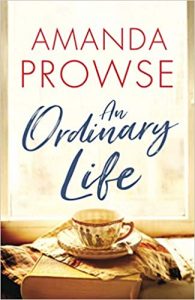 Our book for April was ‘An Ordinary Life’ by Amanda Prowse.
Our book for April was ‘An Ordinary Life’ by Amanda Prowse.
The www.goodreads.com website says: ‘From the bestselling author of The Girl in the Corner comes a tale of love, loss—and one last extraordinary dance.
Christmas Eve, 2019. Ninety-four-year-old Molly lies in her hospital bed. A stroke and a fall may have broken her body—but her mind is alive with memories.
London, 1940s. Molly is a bright young woman, determined to help the war effort and keep her head up despite it all. Life becomes brighter when she meets and falls in love with a man who makes her forget everything with one dance. But then war forces her to make an unforgettable sacrifice, and when she’s brought to her knees by a daring undercover mission with the French Resistance, only her sister knows the secret weighing heavily on Molly’s heart.
Now, lying in her hospital bed, Molly can’t escape the memories of what she lost all those years ago. But she is not as alone as she thinks.
Will she be able to find peace—and finally understand that what seemed to be an ordinary life was anything but?’
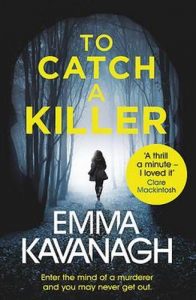 Our book for March is ‘To Catch A Killer’ by Emma Kavanagh.
Our book for March is ‘To Catch A Killer’ by Emma Kavanagh.
Abebooks.co.uk says “I’ve been watching you DS Alice Parr. I saw you trying to save the poor young woman you found in the park. The woman I tried to kill. I’ve been waiting for you to find her family. To find someone who cares about her. But you can’t can you? You’ve never had a case like this. I know everything about you. You know nothing about me. Even though I’m the man you’re looking for. And you will never catch me…”
Our book for January is ‘The Taming of the Queen’ by Philippa Gregory.
The author’s website says:
‘Why would a woman marry a serial killer? Because she cannot refuse…
Kateryn Parr, a thirty-year-old widow in a secret affair with a new lover, has no choice when a man old enough to be her father who has buried four wives – King Henry VIII – commands her to marry him.
Kateryn has no doubt about the danger she faces: the previous queen lasted sixteen months, the one before barely half a year. But Henry adores his new bride and Kateryn’s trust in him grows as she unites the royal family, creates a radical study circle at the heart of the court, and rules the kingdom as regent.
But is this enough to keep her safe? A leader of religious reform and a published author, Kateryn stands out as an independent woman with a mind of her own. But she cannot save the Protestants, under threat for their faith, and Henry’s dangerous gaze turns on her. The traditional churchmen and rivals for power accuse her of heresy – the punishment is death by fire and the king’s name is on the warrant…
From an author who has described all of Henry’s queens comes a deeply intimate portrayal of the last: a woman who longed for passion, power and education at the court of a brutal tyrant.’
 Our book for December was ‘Freakonomics’ by Stephen J. Dubner and Steven Levitt. The Good Reads website says:
Our book for December was ‘Freakonomics’ by Stephen J. Dubner and Steven Levitt. The Good Reads website says:
Which is more dangerous, a gun or a swimming pool? What do schoolteachers and sumo wrestlers have in common? Why do drug dealers still live with their moms? How much do parents really matter? What kind of impact did Roe v. Wade have on violent crime? Freakonomics will literally redefine the way we view the modern world.
These may not sound like typical questions for an economist to ask. But Steven D. Levitt is not a typical economist. He is a much-heralded scholar who studies the stuff and riddles of everyday life — from cheating and crime to sports and child rearing — and whose conclusions regularly turn the conventional wisdom on its head. He usually begins with a mountain of data and a simple, unasked question. Some of these questions concern life-and-death issues; others have an admittedly freakish quality. Thus, the new field of study contained in this book: freakonomics.
Through forceful storytelling and wry insight, Levitt and co-author Stephen J. Dubner show that economics is, at root, the study of incentives — how people get what they want, or need, especially when other people want or need the same thing. In Freakonomics, they set out to explore the hidden side of … well, everything. The inner workings of a crack gang. The truth about real-estate agents. The myths of campaign finance. The telltale marks of a cheating schoolteacher. The secrets of the Ku Klux Klan.
What unites all these stories is a belief that the modern world, despite a surfeit of obfuscation, complication, and downright deceit, is not impenetrable, is not unknowable, and — if the right questions are asked — is even more intriguing than we think. All it takes is a new way of looking. Steven Levitt, through devilishly clever and clear-eyed thinking, shows how to see through all the clutter.
Freakonomics establishes this unconventional premise: If morality represents how we would like the world to work, then economics represents how it actually does work. It is true that readers of this book will be armed with enough riddles and stories to last a thousand cocktail parties. But Freakonomics can provide more than that. It will literally redefine the way we view the modern world.
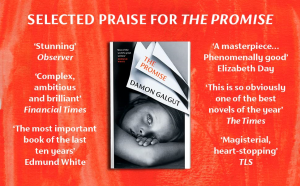
The Book Club’s last meeting was held on Thursday 2nd December.
Our book for November was ‘The Promise’ by Damon Galgut – winner of the 2021 Booker Prize. The Waterstone’s website says:
‘Set during four funerals across four decades, Galgut’s panoramic study of one white South African family’s tribulations foregrounds the intimately personal in the epic narrative of a rapidly changing nation.
The Promise charts the crash and burn of a white South African family, living on a farm outside Pretoria. The Swarts are gathering for Ma’s funeral. The younger generation, Anton and Amor, detest everything the family stand for — not least the failed promise to the Black woman who has worked for them her whole life. After years of service, Salome was promised her own house, her own land… yet somehow, as each decade passes, that promise remains unfulfilled.
The narrator’s eye shifts and blinks: moving fluidly between characters, flying into their dreams; deliciously lethal in its observation. And as the country moves from old deep divisions to its new so-called fairer society, the lost promise of more than just one family hovers behind the novel’s title.
In this story of a diminished family, sharp and tender emotional truths hit home. Confident, deft and quietly powerful, The Promise is literary fiction at its finest.’
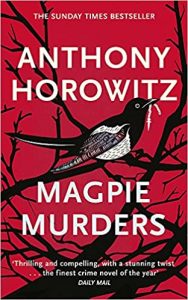
The Book Club’s last meeting was held on Thursday 4th November at 7.30pm in the Bowring Park Pub. Our October book was ‘Magpie Murders’ by Anthony Horowitz.
When editor Susan Ryeland is given the tattered manuscript of Alan Conway’s latest novel, she has little idea it will change her life. She’s worked with the revered crime writer for years and his detective, Atticus Pund, is renowned for solving crimes in the sleepy English villages of the 1950s. As Susan knows only too well, vintage crime sells handsomely. It’s just a shame that it means dealing with an author like Alan Conway…
But Conway’s latest tale of murder at Pye Hall is not quite what it seems. Yes, there are dead bodies and a host of intriguing suspects, but hidden in the pages of the manuscript there lies another story: a tale written between the very words on the page, telling of real-life jealousy, greed, ruthless ambition and murder.
From Sunday Times bestseller Anthony Horowitz comes Magpie Murders, his deliciously dark take on the cosy crime novel, brought bang- up-to-date with a fiendish modern twist.
 The Book Club’s last meeting was held on Thursday 7th October at 7.30pm in the Bowring Park Pub. Our September book was ‘Notes from an Exhibition’ by Patrick Gale.
The Book Club’s last meeting was held on Thursday 7th October at 7.30pm in the Bowring Park Pub. Our September book was ‘Notes from an Exhibition’ by Patrick Gale.
When troubled artist Rachel Kelly dies, she leaves behind an extraordinary body of work – but for her family there is a legacy of secrets and painful revelations. Rachel exerts a power that outlives her. To her children she is both curse and blessing, as they cope with the inheritance of her passions – and demons. Only their father’s gift of stillness can withstand Rachel’s destructive influence and the suspicion that they all came a poor second to her art. Piecing together the clues of her life – as artist, lover, mother, wife and patient – takes the reader from Cornwall to Canada across a span of forty years. What emerges is a tender story of enduring love, and a portrait of a family coping with the sometimes too dazzling brilliance of a genius.
The Book Club’s last meeting was held on Thursday 27th February at 7.30pm in The Roby Pub on Greystone Road.
 Our book for February was ‘An Anonymous Girl’ by Greer Hendricks & Sarah Pekkanen.
Our book for February was ‘An Anonymous Girl’ by Greer Hendricks & Sarah Pekkanen.
The website www.goodreads.com says:
‘When Jessica Farris signs up for a psychology study conducted by the mysterious Dr. Shields, she thinks all she’ll have to do is answer a few questions, collect her money, and leave.
Question #1: Could you tell a lie without feeling guilt? But as the questions grow more and more intense and invasive and the sessions become outings where Jess is told what to wear and how to act, she begins to feel as though Dr. Shields may know what she’s thinking… and what she’s hiding.
Question #2: Have you ever deeply hurt someone you care about? As Jess’s paranoia grows, it becomes clear that she can no longer trust what in her life is real, and what is one of Dr. Shields’ manipulative experiments. Caught in a web of deceit and jealousy, Jess quickly learns that some obsessions can be deadly.
Question #3: Should a punishment always fit the crime? An electrifying novel about doubt, passion, and just how much you can trust someone.’
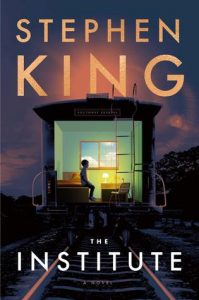 Our book for January was ‘The Institute’ by Stephen King.
Our book for January was ‘The Institute’ by Stephen King.
Waterstone’s website says: Deep in the woods of Maine, there is a dark state facility where kids, abducted from across the United States, are incarcerated. In the Institute they are subjected to a series of tests and procedures meant to combine their exceptional gifts – telepathy, telekinesis – for concentrated effect.
Luke Ellis is the latest recruit. He’s just a regular 12-year-old, except he’s not just smart, he’s super-smart. And he has another gift which the Institute wants to use…
Far away in a small town in South C arolina, former cop Tim Jamieson has taken a job working for the local Sherriff. He’s basically just walking the beat. But he’s about to take on the biggest case of his career.
Back in the Institute’s downtrodden playground and corridors where posters advertise ‘just another day in paradise’, Luke, his friend Kalisha and the other kids are in no doubt that they are prisoners, not guests. And there is no hope of escape.
But great events can turn on small hinges and Luke is about to team up with a new, even younger recruit, Avery Dixon, whose ability to read minds is off the scale. While the Institute may want to harness their powers for covert ends, the combined intelligence of Luke and Avery is beyond anything that even those who run the experiments – even the infamous Mrs Sigsby – suspect.
Thrilling, suspenseful, heartbreaking, The Institute is a stunning novel of childhood betrayed and hope regained.
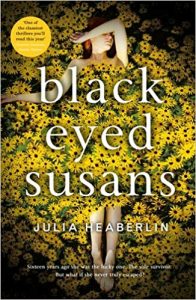 Our book for October was ‘Black Eyed Susans’ by Julia Heaberlin.
Our book for October was ‘Black Eyed Susans’ by Julia Heaberlin.
A chilling thriller that gets into the heart and mind of the killer, and the victim . . .
Seventeen-year-old Tessa, dubbed a ‘Black-Eyed Susan’ by the media, became famous for being the only victim to survive the vicious attack of a serial killer. Her testimony helped to put a dangerous criminal behind bars – or so she thought.
Now, decades later the black-eyed susans planted outside Tessa’s bedroom window seem to be a message from a killer who should be safely in prison . . .
Our book for September was: ‘On Green Dolphin Street’ by Sebastian Faulks.
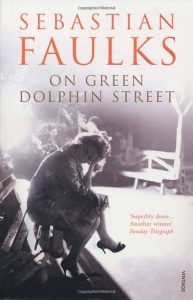 The website www.goodreads.com says: The bestselling author of Birdsong and Charlotte Gray delivers an enthralling, vibrantly evocative novel set in America in 1960, when the country stood poised between the paranoia of the Cold War and the ebullience of the New Frontier.
The website www.goodreads.com says: The bestselling author of Birdsong and Charlotte Gray delivers an enthralling, vibrantly evocative novel set in America in 1960, when the country stood poised between the paranoia of the Cold War and the ebullience of the New Frontier.
Faulks’ heroine is Mary Van der Linden, a pretty, reserved Englishwoman whose husband, Charlie, is posted to the British embassy in Washington. One night at a cocktail party Mary meets Frank Renzo, a reporter who has covered stories from the fall of Dienbienphu to the Emmett Till murder trial in Mississippi. Slowly, reluctantly, they fall in love. Their ensuing affair, in all its desperate elation, plays out against a backdrop that ranges from the jazz clubs of Greenwich Village to the smoke-filled rooms of the Kennedy campaign. A romance in the grand tradition that is also a neon-lit portrait of America at its apogee, On Green Dolphin Street is Sebastian Faulks at the peak of his powers.
The Book Group’s last meeting took place on Thursday 5th September at 7.30pm in The Roby Pub on Greystone Road.
Our books for August were: ‘Erebus: The Story of a Ship’ by Michael Palin and ‘This Child of Ours’ by Sadie Pearse.
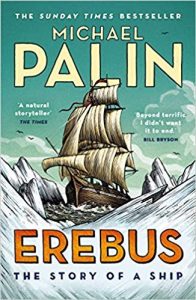 The Waterstone’s website says: The multi-talented Michael Palin turns his talents to maritime history in this extraordinary biography of the sailing vessel, HMS Erebus. Elucidating two very different exploratory voyages, Palin recounts the pioneering successes of James Clark Ross’ passage to the Great Southern Barrier and the tragic outcome of John Franklin’s command to the Arctic, in effortlessly readable style.
The Waterstone’s website says: The multi-talented Michael Palin turns his talents to maritime history in this extraordinary biography of the sailing vessel, HMS Erebus. Elucidating two very different exploratory voyages, Palin recounts the pioneering successes of James Clark Ross’ passage to the Great Southern Barrier and the tragic outcome of John Franklin’s command to the Arctic, in effortlessly readable style.
In September 2014 the wreck of a sailing vessel was discovered at the bottom of the sea in the frozen wastes of the Canadian arctic. It was broken at the stern and covered in a woolly coat of underwater vegetation. Its whereabouts had been a mystery for over a century and a half. Its name was HMS Erebus.
Now Michael Palin – former Monty Python stalwart and much-loved television globetrotter – brings this extraordinary ship back to life, following it from its launch in 1826 to the epic voyages of discovery that led to glory in the Antarctic and to ultimate catastrophe in the Arctic.
He explores the intertwined careers of the men who shared its journeys: the dashing James Clark Ross who charted much of the ‘Great Southern Barrier’ and oversaw some of the earliest scientific experiments to be conducted there; and the troubled John Franklin, who at the age of sixty and after a chequered career, commanded the ship on its final, disastrous expedition.
Palin also vividly recounts the experiences of the men who first stepped ashore on Antarctica’s Victoria Land, and those who, just a few years later, froze to death one by one in the Arctic ice, as rescue missions desperately tried to reach them.
The result is a wonderfully evocative account of one of the most extraordinary adventures of the nineteenth century, as re-imagined by a master explorer and storyteller.
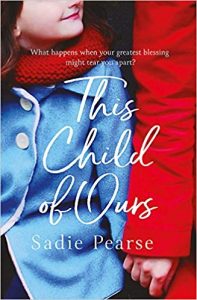 The website www.fantasticfiction.com says: A daughter’s cry for help is tearing her parents apart. You know what’s best for your child. Don’t you?
The website www.fantasticfiction.com says: A daughter’s cry for help is tearing her parents apart. You know what’s best for your child. Don’t you?
Riley Pieterson is an adventurous girl with lots of questions. There’s plenty she doesn’t know yet; what a human brain looks like. All the constellations in the night sky. Why others can’t see her the way she sees herself.
When Riley confides in her parents – Sally and Theo – that she feels uncomfortable in her own skin, a chain of events begins that changes their lives forever. Sally wants to support her daughter by helping her be who she dreams of being. Theo resists; he thinks Riley is a seven-year-old child pushing boundaries. Both believe theirs is the only way to protect Riley and keep her safe.
With the well-being of their child at stake, Sally and Theo’s relationship is pushed to breaking point. To save their family, each of them must look deeply at who they really are.
A story of a marriage in crisis and a child caught in the middle, this is a beautiful novel of parents and their children, and how far we’re prepared to go in the name of love.
Perfect for fans of Jodi Picoult, Laurie Frankel, Kate Hewitt and Jill Childs.
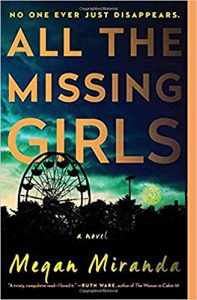 The Book Group’s last meeting will took place on Thursday 25th July at 7.30pm in The Roby Pub on Greystone Road.
The Book Group’s last meeting will took place on Thursday 25th July at 7.30pm in The Roby Pub on Greystone Road.
Our July book was ‘All the Missing Girls’ by Megan Miranda.
The website www.goodreads.com says: Like the spellbinding psychological suspense in The Girl on the Train and Luckiest Girl Alive, Megan Miranda’s novel is a nail-biting, breathtaking story about the disappearances of two young women—a decade apart—told in reverse.
It’s been ten years since Nicolette Farrell left her rural hometown after her best friend, Corinne, disappeared from Cooley Ridge without a trace. Back again to tie up loose ends and care for her ailing father, Nic is soon plunged into a shocking drama that reawakens Corinne’s case and breaks open old wounds long since stitched.
The decade-old investigation focused on Nic, her brother Daniel, boyfriend Tyler, and Corinne’s boyfriend Jackson. Since then, only Nic has left Cooley Ridge. Daniel and his wife, Laura, are expecting a baby; Jackson works at the town bar; and Tyler is dating Annaleise Carter, Nic’s younger neighbor and the group’s alibi the night Corinne disappeared. Then, within days of Nic’s return, Annaleise goes missing.
Told backwards—Day 15 to Day 1—from the time Annaleise goes missing, Nic works to unravel the truth about her younger neighbor’s disappearance, revealing shocking truths about her friends, her family, and what really happened to Corinne that night ten years ago.
Like nothing you’ve ever read before, All the Missing Girls delivers in all the right ways. With twists and turns that lead down dark alleys and dead ends, you may think you’re walking a familiar path, but then Megan Miranda turns it all upside down and inside out and leaves us wondering just how far we would be willing to go to protect those we love.
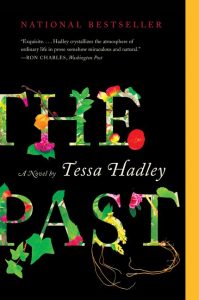 The Book Group met on Thursday 23rd May at 7.30pm in The Roby Pub on Greystone Road.
The Book Group met on Thursday 23rd May at 7.30pm in The Roby Pub on Greystone Road.
Our May book was ‘The Past’ by Tessa Hadley. The Harper-Collins website says:
Winner of the Windham Campbell Prize • A Washington Post Best Book of the Year • A Time Best Book of the Year • A San Francisco Chronicle Top 10 Book of the Year • A Huffington Post Best Fiction Book of the Year • A New York Times Editors’ Choice
In her most accessible, commercial novel yet, the “supremely perceptive writer of formidable skill and intelligence (New York Times Book Review) turns her astute eye to a dramatic family reunion, where simmering tensions and secrets come to a head over three long, hot summer weeks.
With five novels and two collections of stories, Tessa Hadley has earned a reputation as a fiction writer of remarkable gifts. She brings all of her considerable skill and an irresistible setup to The Past, a novel in which three sisters, a brother, and their children assemble at their country house.
These three weeks may be their last time there; the upkeep is prohibitive, and they may be forced to sell this beloved house filled with memories of their shared past (their mother took them there to live when she left their father). Yet beneath the idyllic pastoral surface, hidden passions, devastating secrets, and dangerous hostilities threaten to consume them.
Sophisticated and sleek, Roland’s new wife (his third) arouses his sisters’ jealousies and insecurities. Kasim, the twenty-year-old son of Alice’s ex-boyfriend, becomes enchanted with Molly, Roland’s sixteen-year-old daughter. Fran’s young children make an unsettling discovery in a dilapidated cottage in the woods that shatters their innocence. Passion erupts where it’s least expected, leveling the quiet self-possession of Harriet, the eldest sister.
Over the course of this summer holiday, the family’s stories and silences intertwine, small disturbances build into familial crises, and a way of life—bourgeois, literate, ritualized, Anglican—winds down to its inevitable end.
With subtle precision and deep compassion, Tessa Hadley brilliantly evokes a brewing storm of lust and envy, the indelible connections of memory and affection, the fierce, nostalgic beauty of the natural world, and the shifting currents of history running beneath the surface of these seemingly steady lives. The result is a novel of breathtaking skill and scope that showcases this major writer’s extraordinary talents.

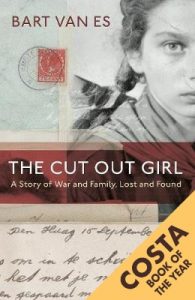 The Book Group met on Thursday 25th April at 7.30pm in The Roby Pub on Greystone Road.
The Book Group met on Thursday 25th April at 7.30pm in The Roby Pub on Greystone Road.
During March and April we read ‘War Doctor: Surgery on the Front Line’ by David Nott and ‘The Cut Out Girl’ by Bart van Es.
‘War Doctor: Surgery on the Front Line’: For more than twenty-five years, David Nott has taken unpaid leave from his job as a general and vascular surgeon with the NHS to volunteer in some of the world’s most dangerous war zones. From Sarajevo under siege in 1993, to clandestine hospitals in rebel-held eastern Aleppo, he has carried out life-saving operations and field surgery in the most challenging conditions, and with none of the resources of a major London teaching hospital.
The conflicts he has worked in form a chronology of twenty-first-century combat: Afghanistan, Sierra Leone, Liberia, Darfur, Congo, Iraq, Yemen, Libya, Gaza and Syria. But he has also volunteered in areas blighted by natural disasters, such as the earthquakes in Haiti and Nepal.
Driven both by compassion and passion, the desire to help others and the thrill of extreme personal danger, he is now widely acknowledged to be the most experienced trauma surgeon in the world. But as time went on, David Nott began to realize that flying into a catastrophe – whether war or natural disaster – was not enough. Doctors on the ground needed to learn how to treat the appalling injuries that war inflicts upon its victims. Since 2015, the foundation he set up with his wife, Elly, has disseminated the knowledge he has gained, training other doctors in the art of saving lives threatened by bombs and bullets. War Doctor is his extraordinary story.
(From the Pan Macmillan website.)
‘The Cut Out Girl’: Little Lien wasn’t taken from her Jewish parents – she was given away in the hope that she might be saved. Hidden and raised by a foster family in Amsterdam during the Nazi occupation, she survived the war only to find that her real parents had not. Much later, she fell out with her foster family, and Bart van Es – the grandson of Lien’s foster parents – knew he needed to find out why.
His account of tracing Lien and telling her story is a searing exploration of two lives and two families. It is a story about love and misunderstanding and about the ways that our most painful experiences – so crucial in defining us – can also be redefined.
(From the Penguin website.)
The Book Group’s last meeting took place on Thursday 28th February at 7.30pm in The Roby Pub on Greystone Road.
Since our last meeting, we read ‘Greetings from Bury Park’ by Sarfraz Manzoor.
The Bloomsbury website says:
Sarfraz Manzoor was two years old when his family emigrated from Pakistan to join his father in Bury Park, Luton. His teenage years were a constant battle to reconcile being both British and Muslim. But when his best friend introduced him to Bruce Springsteen, his life changed for ever.
In this affectionate and timely memoir, Manzoor retraces his journey from the frustrations of his childhood to his reaction to the tragedies of 9/11 and 7/7. Original, darkly tender and wryly amusing, this is an inspiring tribute to the power of music to transcend race and religion and a moving account of a relationship between father and son.
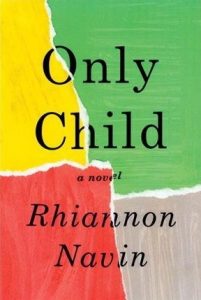 The Book Group’s last meeting took place on Thursday 6th December at 7.30pm in The Roby Pub on Greystone Road.
The Book Group’s last meeting took place on Thursday 6th December at 7.30pm in The Roby Pub on Greystone Road.
We read ‘Only Child’ by Rhiannon Navin.
Amazon says: Heartstopping. Heartbreaking. Heartwarming.
Compelling, compassionate and powerful, Rhiannon Navin’s Only Child is the most heartfelt book you’ll read this year.
We all went to school that Tuesday like normal. Not all of us came home.
When the unthinkable happens, six-year-old Zach is at school. Huddled in a cloakroom with his classmates and teacher, he is too young to understand that life will never be the same again.
Afterwards, the once close-knit community is left reeling. Zach’s dad retreats. His mum sets out to seek revenge. Zach, scared, lost and confused, disappears into his super-secret hideout to try to make sense of things. Nothing feels right – until he listens to his heart . . .
But can he remind the grown-ups how to love again?
Narrated by Zach, Only Child is full of heart; a real rollercoaster of a read that will stay with you long after you’ve turned the final page.
The Book Group met on Thursday 1st December at 7.30pm in The Roby Pub on Greystone Road.
We read ‘Reservoir 13’ by Jon McGregor.
Good Reads says:
Midwinter in an English village. A teenage girl has gone missing. Everyone is called upon to join the search. The villagers fan out across the moors as the police set up roadblocks and a crowd of news reporters descends on what is usually a place of peace. Meanwhile, there is work that must still be done: cows milked, fences repaired, stone cut, pints poured, beds made, sermons written, a pantomime rehearsed. As the seasons unfold and the search for the missing girl goes on, there are those who leave the village and those who are pulled back; those who come together and those who break apart. There are births and deaths; secrets kept and exposed; livelihoods made and lost; small kindnesses and unanticipated betrayals. An extraordinary novel of cumulative power and grace, RESERVOIR 13 explores the rhythms of the natural world and the repeated human gift for violence, unfolding over thirteen years as the aftershocks of a tragedy refuse to subside.
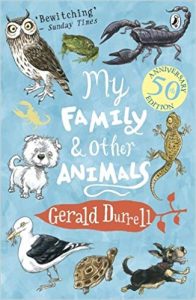 The Book Group met on Thursday 4th October at 7.30pm in The Roby Pub on Greystone Road.
The Book Group met on Thursday 4th October at 7.30pm in The Roby Pub on Greystone Road.
We read ‘My Family and Other Animals’ by Gerald Durrell.
Amazon says:
My Family and Other Animals is the bewitching account of a rare and magical childhood on the island of Corfu by treasured British conservationist Gerald Durrell.
Escaping the ills of the British climate, the Durrell family – acne-ridden Margo, gun-toting Leslie, bookworm Lawrence and budding naturalist Gerry, along with their long-suffering mother and Roger the dog – take off for the island of Corfu.
But the Durrells find that, reluctantly, they must share their various villas with a menagerie of local fauna – among them scorpions, geckos, toads, bats and butterflies.
Recounted with immense humour and charm My Family and Other Animals is a wonderful account of a rare, magical childhood.
‘Durrell has an uncanny knack of discovering human as well as animal eccentricities’ Sunday Telegraph ‘A bewitching book’ Sunday Times
The Book Group met on Thursday 6th September at 7.30pm in The Roby Pub on Greystone Road.
We read ‘Empty Cradles’ by Margaret Humphreys.
The Penguin Books website says:
EMPTY CRADLES is a powerful testament to an ordinary woman’s astonishing dedication, compassion and stubborn courage.
In 1986 Margaret Humphreys, a Nottingham social worker and mother of two, investigated the case of a woman who claimed that, at the age of four, she had been put on a boat to Australia by the British government. At first incredulous, Margaret Humphreys soon discovered that this woman’s story was just the tip of an enormous iceberg. As many as an estimated 150,000 children had in fact been deported from children’s homes in Britian and shipped off to a ‘new life’ in distant parts of the Empire – the last as recently as 1967.
Many of the children were told that their parents were dead. Their parents, too, were often deceived; many believed that their children had been adopted in Britain. The reality was very different: for numerous children it was to be a life of horrendous physical and sexual abuse in institutions in Western Australia and elsewhere.
Margaret Humphreys reveals how she gradually unravelled this shocking secret; how she became drawn into the lives of some of these innocent and unwilling exiles, how it became her mission to reunite them with their families in Britain, and how her lonely crusade led to the founding of the Child Migrants Trust.
EMPTY CRADLES is a strong indictment of government, as well as charitable and religious organisations. It is a sad, harrowing story that will move the reader to anger and tears. Yet it offers a message of hope to all the victims of a shameful scandal that has been ignored for too long.
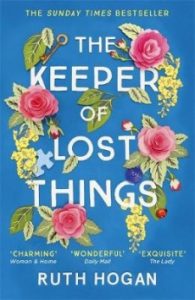 The Book Group met on Thursday 26th July at 7.30pm in The Roby Pub on Greystone Road.
The Book Group met on Thursday 26th July at 7.30pm in The Roby Pub on Greystone Road.
We read: ‘The Keeper of Lost Things’ by Ruth Hogan.
The website www.goodreads.com says:
A charming, clever, and quietly moving debut novel of endless possibilities and joyful discoveries that explores the promises we make and break, losing and finding ourselves, the objects that hold magic and meaning for our lives, and the surprising connections that bind us.
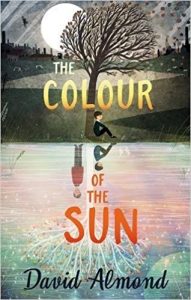 The Book Group met on Thursday 28th June at 7.30pm in The Roby Pub on Greystone Road.
The Book Group met on Thursday 28th June at 7.30pm in The Roby Pub on Greystone Road.
We read: ‘The Colour of the Sun’ by David Almond.
Waterstone’s website says:
This is a moving, funny and inspirational novel from the bestselling author of Skellig.
“The day is long, the world is wide, you’re young and free.”
One hot summer morning, Davie steps boldly out of his front door. The world he enters is very familiar – the little Tyneside town that has always been his home – but as the day passes, it becomes ever more mysterious.
A boy has been killed, and Davie thinks he might know who is responsible. He turns away from the gossip and excitement and sets off roaming towards the sunlit hills above the town.
As the day goes on, the real and the imaginary start to merge, and Davie knows that neither he nor his world will ever be the same again.
This an outstanding novel full of warmth and light, from a multi-award-winning author. David Almond says: ‘I guess it embodies my constant astonishment at being alive in this beautiful, weird, extraordinary world.’
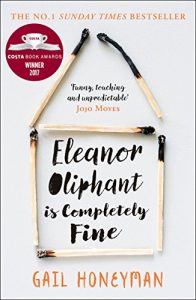 The Book Group met on Thursday 24th May at 7.30pm in The Roby Pub on Greystone Road.
The Book Group met on Thursday 24th May at 7.30pm in The Roby Pub on Greystone Road.
We read: ‘Eleanor Oliphant is Completely Fine’ by Gail Honeyman.
‘Eleanor Oliphant is Completely Fine’ won the 2017 Costa Book Award. The website www.goodreads.com says:
No one’s ever told Eleanor that life should be better than fine.
Meet Eleanor Oliphant: She struggles with appropriate social skills and tends to say exactly what she’s thinking. Nothing is missing in her carefully timetabled life of avoiding social interactions, where weekends are punctuated by frozen pizza, vodka, and phone chats with Mummy.
But everything changes when Eleanor meets Raymond, the bumbling and deeply unhygienic IT guy from her office. When she and Raymond together save Sammy, an elderly gentleman who has fallen on the sidewalk, the three become the kind of friends who rescue one another from the lives of isolation they have each been living. And it is Raymond’s big heart that will ultimately help Eleanor find the way to repair her own profoundly damaged one.
Soon to be a major motion picture produced by Reese Witherspoon, ‘Eleanor Oliphant Is Completely Fine’ is the smart, warm, and uplifting story of an out-of-the-ordinary heroine whose deadpan weirdness and unconscious wit make for an irresistible journey as she realizes. . .
The only way to survive is to open your heart.
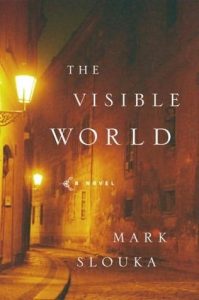 The Book Group met on Thursday 26th April at 7.30pm in The Roby Pub on Greystone Road.
The Book Group met on Thursday 26th April at 7.30pm in The Roby Pub on Greystone Road.
We read ‘The Visible World’ by Mark Slouka as our book for April.
Amazon says: ‘My mother knew a man during the war. Theirs was a love story, and like any good love story, it left blood on the floor and wreckage in its wake’. As a boy growing up in New York, his parents’ memories of their Czech homeland seem to belong to another world, as distant and unreal as the fairy tales his father tells him.
It is only as an adult, when he makes his own journey to Prague, that he is finally able to piece together the truth of his parents’ past: what they did, who his mother loved, and why they were never able to forget ?
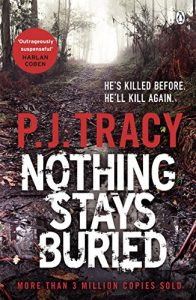 The Book Group met on Thursday 22nd March at 7.30pm in The Roby Pub on Greystone Road.
The Book Group met on Thursday 22nd March at 7.30pm in The Roby Pub on Greystone Road.
We read P. J. Tracy’s ‘Nothing Stays Buried’ as our book for March.
Amazon says: A young woman is murdered in a park in Minneapolis. When detectives Gino and Magozzi discover a playing card near the body, they recognise the work of a serial killer who has already struck the city once before.
But it’s worse than they imagined. The card is the four of spades; the last victim’s was the ace: it seems they’re already two murders behind.
Once again working with Grace MacBride and her team of analysts, they discover a web of evidence stretching back into the past. And there is little time to untangle it: this killer has a taste for blood, and he’s intent on playing out the deck . . .
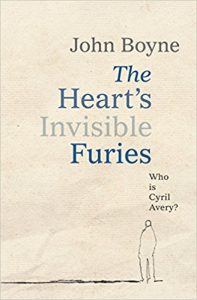 The Book Group met will on Thursday 22nd February at 7.30pm in The Roby Pub on Greystone Road.
The Book Group met will on Thursday 22nd February at 7.30pm in The Roby Pub on Greystone Road.
We read John Boyne’s ‘The Heart’s Invisible Furies’ as our book for February.
Amazon says: Cyril Avery is not a real Avery or at least that’s what his adoptive parents tell him. And he never will be. But if he isn’t a real Avery, then who is he?
Born out of wedlock to a teenage girl cast out from her rural Irish community and adopted by a well-to-do if eccentric Dublin couple via the intervention of a hunchbacked Redemptorist nun, Cyril is adrift in the world, anchored only tenuously by his heartfelt friendship with the infinitely more glamourous and dangerous Julian Woodbead.
At the mercy of fortune and coincidence, he will spend a lifetime coming to know himself and where he came from – and over his three score years and ten, will struggle to discover an identity, a home, a country and much more.
In this, Boyne’s most transcendent work to date, we are shown the story of Ireland from the 1940s to today through the eyes of one ordinary man. The Heart’s Invisible Furies is a novel to make you laugh and cry while reminding us all of the redemptive power of the human spirit.
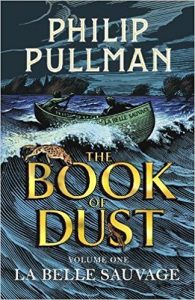 The Book Group met on Thursday 25th January at 7.30pm in The Roby Pub on Greystone Road.
The Book Group met on Thursday 25th January at 7.30pm in The Roby Pub on Greystone Road.
We read Philip Pullman’s ‘La Belle Sauvage – The Book of Dust Volume One’ as our book for Nov / Dec.
Seventeen years after Philip Pullman’s third volume of His Dark Materials trilogy sealed the door on Dust, daemons, witches and armoured bears, a tantalising new chapter now lies open with La Belle Sauvage: The Book of Dust Volume One. Winding the clock back a decade before the events of the original series, La Belle Sauvage promises the return of Lyra – here still an infant – and the emergence of young Malcolm Polstead, the future academic who suddenly finds himself drawn into the cloak-and-dagger intrigue….
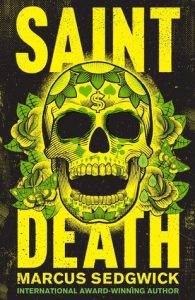 Marcus Sedgwick’s ‘Saint Death’ was our book for October.
Marcus Sedgwick’s ‘Saint Death’ was our book for October.
The Book Group met on Thursday 2nd November at 7.30pm in The Roby Pub on Greystone Road.
‘Saint Death’ is a potent, powerful and timely thriller about migrants, drug lords and gang warfare set on the US/Mexican border by prize-winning novelist, Marcus Sedgwick.
Anapra is one of the poorest neighbourhoods in the Mexican city of Juarez – twenty metres outside town lies a fence – and beyond it – America – the dangerous goal of many a migrant.










